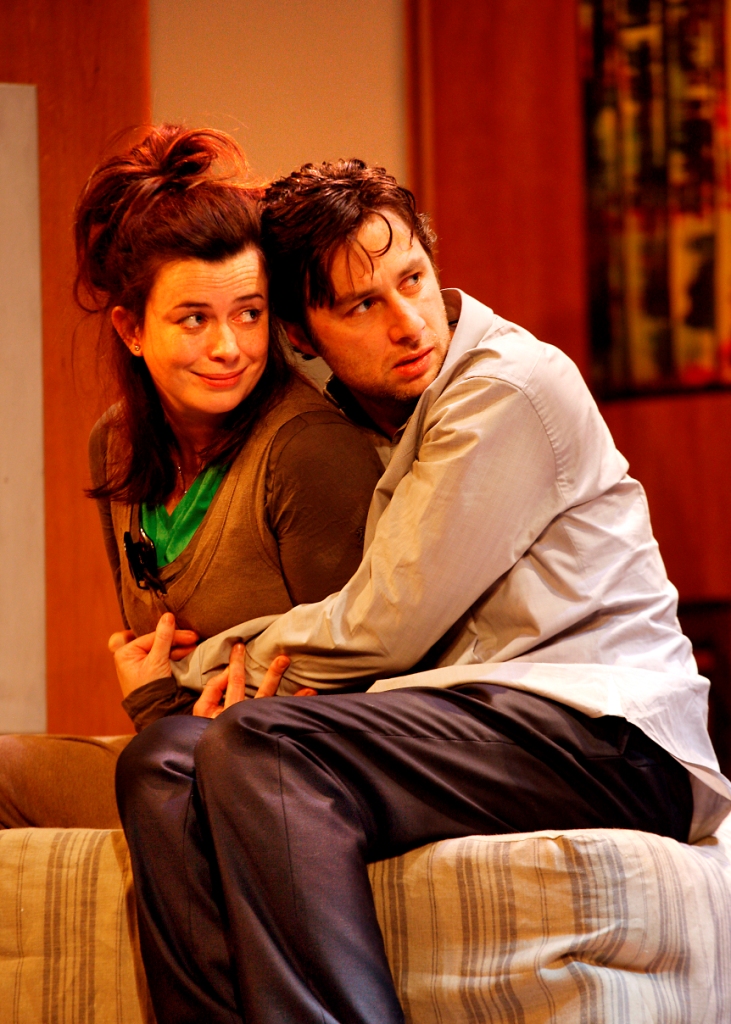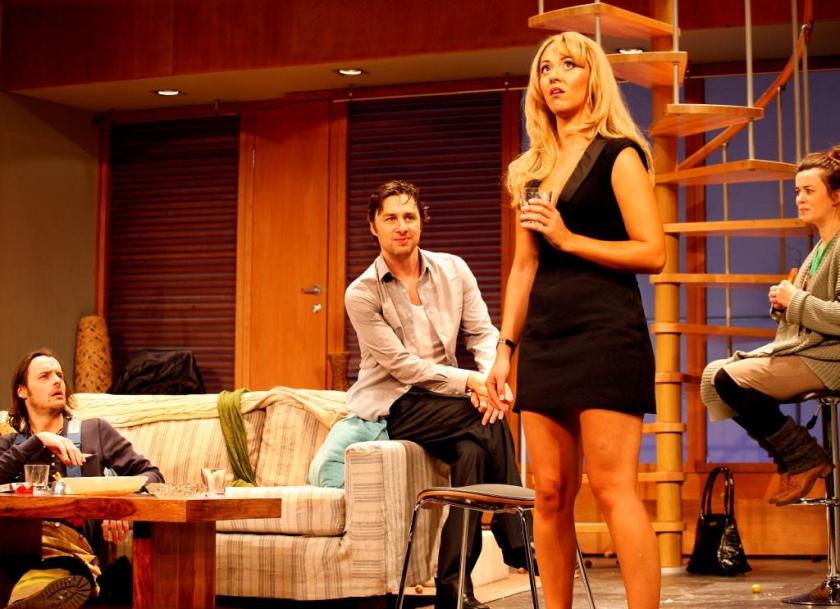Zach Braff’s debut theatre piece begins with Charlie (Mr Braff himself), in an empty house, swinging from a noosed extension lead, attempting to do the big FO while f(l)ailing to extinguish a cigarette and listening to the bagpipes on a record-player. At which crucial moment he is interrupted by Emma, a flibbertigibbety-type Brit realtor; then Myron, the local drama-teacher-turned-fire-chief/drug-kingpin; and then Kim, a callgirl. All of whom seem hell bent on spoiling Charlie’s big day.
So far, then, so full of comic potential – and indeed, with All New People, both as script-writer and as actor, Braff is on familiar ground. Literally, in fact. He returns, as in his award-winning film Garden State, to his native New Jersey (to Long Beach Island, in the off-season). And, much like in Scrubs, the long-running US hospital comedy, his character is at the heart of a knockabout type of humour, to some extent steering the show by dragging the others round in his orbit.
Braff hovers in his stock Venn overlap of near-hysteria and pressure-cooking peeve
As the play begins to shape itself into a lightish tetralogue on the kindness – howsoever inadvertent and erratic – of strangers, Charlie/Braff hovers in his stock Venn overlap of near-hysteria and pressure-cooking peeve (“You seem like a very nice person.” “Do I?” “No!”), throwing up plenty of chuckleworthy scenarios, not least because the other three characters are more-or-less blatantly prepackaged to facilitate same: the stoned and flighty Emma (Eve Myles, pictured below with Braff) accidentally destroying a priceless African artwork belonging to Charlie's mate; the clued-up but constitutionally unstable Myron (Paul Hilton) reciting “Hath not a Jew eyes?” as a party-warmer; Kim (the delightfully curvaceous but perhaps somewhat underused Susannah Fielding [no, that’s not a leer]) explaining, a little coyly, that though she’s been contracted to do whatever might please Charlie, “between you and I, I’d prefer it if you stayed away from my asshole;” and Charlie, minute after frustrated minute, growing thoroughly sick of the lot of ‘em and their attempts to perk him up. “I’m guessing you don’t believe in the afterlife,” says Emma, cheerily. “No,” he replies, looking around him, “just Purgatory.”
 So, lots of good set-ups, no shortage of neat lines (Emma, in a moment of clarity, likens the store we set by love to “trying to build a house of cards on the back of a squirrel”), and I wouldn't be so cruel as to give away the ending; but once you realise that the play was conceived as a middleweight meditation on the value of friendship, love and shared adversity – not, historically, a topic that’s lacked coverage – the whole thing starts to score dangerously high on the So-what-ometer.
So, lots of good set-ups, no shortage of neat lines (Emma, in a moment of clarity, likens the store we set by love to “trying to build a house of cards on the back of a squirrel”), and I wouldn't be so cruel as to give away the ending; but once you realise that the play was conceived as a middleweight meditation on the value of friendship, love and shared adversity – not, historically, a topic that’s lacked coverage – the whole thing starts to score dangerously high on the So-what-ometer.
Sure, you still want to know where everything is going (which cannot always be said), and things do happen, and the plot moves forward; but the drama, per se, never really amounts to much. The play veers neither to full-out farce nor sharp-edged tragicomedy (and Braff wouldn’t have been the right man for the job if it had). The variously award-winning cast could almost certainly have offered more if the script demanded it; but it doesn’t. Some lines feel adjusted for the London audience, which doesn’t sit right. And the characters’ “difficult” back-stories – as shown in projector-screen flashbacks – don’t quite seem to fit (or perhaps, in just 95 minutes, they are simply not given time to). They hint at rather too much, then deliver almost nothing.
Which pretty much sums it up, really – leaving one wondering, a little sadly, if a play of this relatively unambitious calibre would have been judged ready for the professional stage if (someone like) Braff’s name hadn’t been stapled to it not once, but a couple of times.
True enough, All New People doesn't anywhere profess to the status of great art, and, all things considered, it's a pleasant enough distraction for an evening (as Charlie himself might well have concluded!). Certainly, it is redeemed by its gags. For safety's sake, though, it should probably be billed as the stage equivalent of what Graham Greene called an “entertainment”. A reasonable storyline, plenty of laughs; but absolutely no reason to see it twice.
- All New People at the Duke of York's Theatre until April 28













Add comment